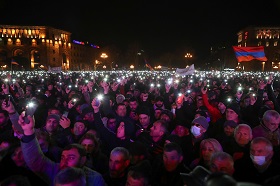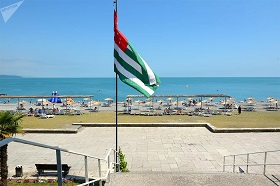The recent arrival of Russian peacekeepers in Nagorno-Karabakh has underlined the difficulties for a number of international institutions to provide a diplomatic answer to violent conflicts that emerged in the aftermath of the collapse of the Soviet Union.
In over three decades, the political-economic context of the South Caucasus has deteriorated, as the region witnessed a continuous decline in birth rates coupled with emigration, difficult economic recovery and the rise of autocratic political regimes and confirmed cronyism.
Some experts believe it is time for the South Caucasus countries to develop a Blue Ocean strategy and abandon the idea of joining the Euro-Atlantic institutions (the EU and NATO) or Russian-led alternatives (the EAEU and the CSTO). This may seem challenging, but given the economic and diplomatic achievements of the past decade and the political crisis in the context of the COVID-19 pandemic, it is perhaps a viable option for restoring prosperity and stability in this part of the world.
A major obstacle to effective implementation of a Blue Ocean strategy in the region will come from the phenomenon of repetition compulsion and the fact that elites and citizens are not used to listening to another political discourse, often asking for outside help to solve domestic issues.
The second obstacle that states will face in the South Caucasus is that neighboring countries have an incentive in keeping the states located next to them under control. At present, the main outsiders–Russia, the EU/NATO and Turkey– have little or no interest in seeing the South Caucasus enjoy greater autonomy.
The recent arrival of Russian peacekeepers in Nagorno-Karabakh has underlined the difficulties for a number of international institutions–the United Nations (UN), the Organization for Security and Co-operation in Europe (OSCE), the European Union (EU) and the Eurasian Economic Union (EAEU)–to provide a diplomatic answer to violent conflicts that emerged in the aftermath of the collapse of the Soviet Union.
Nagorno-Karabakh is the latest example, as most of the ethnic quarrels in the South Caucasus are still ongoing since 1991, with Abkhazia and South Ossetia remaining de facto [1] independent from Georgia, while only one of the three recognized countries (Armenia, Georgia, and Azerbaijan), Armenia, has managed to join a supranational framework [2].
In over three decades, the political-economic context of the region has deteriorated with a continuous decline in birth rates coupled with emigration, difficult economic recovery and the rise of autocratic political regimes and confirmed cronyism. Some experts believe it is time for the South Caucasus countries to develop a Blue Ocean strategy [3] and abandon the idea of joining the Euro-Atlantic institutions (the EU and NATO) or Russian-led alternatives (the EAEU and the CSTO). This may seem challenging, but given the economic and diplomatic achievements of the past decade and the political crisis in the context of the COVID-19 pandemic, it is perhaps a viable option for restoring prosperity and stability in this part of the world.
What is the Blue Ocean Strategy and how can it be applied in international politics?
The Blue Ocean Strategy is a concept developed at INSEAD by Renée Mauborgne and W. Chan Kim. Although the approach usually applies to business strategy, it can be combined with a SWOT analysis to develop new geopolitical alternatives and provide innovative thinking in politics.
Therefore, by looking at the SWOT matrix for the South Caucasus, we can establish similarities between the countries and see how the Blue Ocean strategy approach can develop the “opportunity” part in the region:
|
SWOT Matrix of the South Caucasus
|
|
Strengths
|
- Located between great players - Russia, Turkey, EU and Asia - the South Caucasus can be successfully used as a platform for the production, transfer and transformation of goods;
- Favorable climate for the development of renewable energies and products in with a high demand on international markets (e.g. Georgian wine on the Chinese market).
|
|
Weaknesses
|
- Difficulties to overcome the events following the break-up of the Soviet Union (e.g. rhetoric regarding separatism in Georgia) and political repetition compulsion;
- Insufficient resilience to international influence, as highlighted by the interest of all parties in joining an alliance (e.g. the European Union), which makes it ambiguous for the state(s) to develop an independent international policy;
- Corruption and cronyism in governments resulting in a paucity of innovation by the institutions and little support for the growth of innovative businesses.
|
|
Opportunities
|
- Under-explored markets such as renewable energy, biological agriculture and high-tech;
- Affordable and skilled labour resources available;
- Possible regional cooperation between the three main countries - Georgia, Armenia, Azerbaijan - instead of seeking different alliances outside the South Caucasus
|
|
Threats
|
- Remaining ethnic tensions (internal and external) and the constraint of continuous political repetition compulsion regarding the de facto autonomous territories;
- Laissez-faire the corruption and cronyism at all levels of the state hampering the development of innovative thinking and increasing the human capital flight (brain drain);
- An emphasis is on external actors to solve internal problems (e.g. the European Union to solve economic issues instead of investment in higher education and entrepreneurship).
|
By analyzing the SWOT matrix, we can establish similarities between the three recognized countries and the three de facto/partially recognized states–Abkhazia, South Ossetia, Nagorno-Karabakh–having close SWOT profiles.
As such, the SWOT matrix underlines the countries’ profiles in the South Caucasus, and difficulties seem to stem from weak institutions, with an enforced political repetition compulsion [4] by elites and citizens alike, rather than from external threat(s) [5]. Nonetheless, the external threat is presented as the main one (e.g. Russia in Georgia and Turkey/Azerbaijan in Armenia), while the problems seem to be mostly domestic, having a lot to do with corruption or difficulties to accept the change of borders in the post-Soviet order.
Towards the effective implementation of a Blue Ocean strategy in the South Caucasus
A major obstacle to effective implementation of a Blue Ocean strategy in the region will come from the phenomenon of repetition compulsion and the fact that elites and citizens are not used to listening to another political discourse, often asking for outside help to solve domestic issues. As such, we can assume that states in the South Caucasus will be more likely to continue to focus on finding external alliances instead of using their own internal resources to develop their potential.
This phenomenon is linked to the in-group bias, which is the tendency to assume that ‘your’ problems are coming from the outside (e.g. Russia in Georgia) instead of assuming the responsibility related to ‘your’ own failing policy [6]. Thus, a nation will tend, even more so in times of crisis, to assume that the problem is due to an outside event.
The second obstacle that states will face in the South Caucasus is that neighboring countries have an incentive in keeping the states located next to them under control. At present, the main outsiders–Russia, the EU/NATO and Turkey– have little or no interest in seeing the South Caucasus enjoy greater autonomy.
In fact, some have even developed the rhetoric of ‘grandiosity [7],’ which refers to an unrealistic sense of superiority, characterized by a sustained view of oneself as better than the other, which is expressed by disdainfully regarding them as inferior. This approach is implemented in numerous forms through instruments of power, such as the Eastern Partnership (EaP) which aims to promote European values without taking into account the possibility that a state in the South Caucasus may differ in the way it wishes and should develop.
In the eyes of many EU citizens, the EaP is a means of promoting EU’s identity such as democracy, while non-Europeans would point out such an instrument has been implemented to achieved an economic and/or political superiority (the rhetoric of ‘grandiosity’) over participating states as they can only wish, in the mind of the one implementing them, to be like the EU member states [8]. The rhetoric of grandiosity is identified when the proponent refuses to assume that it may be wrong (cognitive dissonance).
The South Caucasus nations will therefore have to change their internal thinking and concentrate more on what they have and develop strengths instead of waiting for outside assistance. For instance, rather than focusing on how to get the separatist territories back and who could help them achieve this geopolitical goal, in order to increase their internal performance and economic capacities they could focus on fighting corruption, thus making themselves in fine more attractive in the eyes of autonomist regions (soft power) and a valuable political alternative.
Once this is achieved, there will be resistance from the major players–Russia, the West, and Turkey–to seeing the South Caucasus states outside their sphere of influence, which will be another obstacle to the long-term development and continued implementation of the Blue Ocean strategy for self-development.
In many ways, the strategy for the South Caucasus can be inspired by South Korea, a country that, instead of focusing on recovering control over North Korea and explaining a poor economic performance because of the difficult regional context (proximity to the USSR and the People’s Republic of China), managed to see its national advantages and emerge as a self-sustaining economic power.
While North Korea remains a priority in foreign affairs, as does the relationship with Beijing, Seoul has focused on internal development after 1953, subsequently or complementarily on international alliances. Like South Korea, the South Caucasus might focus on solving internal issues before outside matters, especially considering the stagnation with para-states for already more than three decades.
1. de jure according to some states such as Russia, Syria and Venezuela
2. Armenia is a member of the Eurasian Economic Union, however without Nagorno-Karabakh which is recognised to be de jure part of Azerbaijan.
3. https://www.blueoceanstrategy.com
4. Edward Bibring (1943). The Conception of the Repetition Compulsion. The Psychoanalytic Quarterly. 12 (4): 486–519.
5. The situation in Abkhazia and South Ossetia is stabilised since 2008, and the rhetoric of a Russian interest in occupying the whole Georgia does not goes in line with a geopolitical reality. As such, Tbilisi could develop its internal policy on the short run and focus on the two “occupied” territories (Abkhazia and South Ossetia) on the long run instead.
6. Hall. Taylor, Donald M.; Doria, Janet R. (April 1981). Self-serving and group-serving bias in attribution. Journal of Social Psychology. 113 (2): 201–211.
7. Elsa F. Ronningstam (2005). Identifying and Understanding the Narcissistic Personality. Oxford University Press.
8. Women's rights, democracy, freedom of expression, human rights are all examples of what EU citizens believe they can bring to the South Caucasus through the Eastern Partnership. This does not mean that they are not valuable to the countries, but rather that the lack of debate on whether and why to promote them expresses 'grandiosity', the assumption of values superior to any others, similar to what happened during colonialism, when Europeans considered Christianity to be superior to any other religion in colonised countries.







